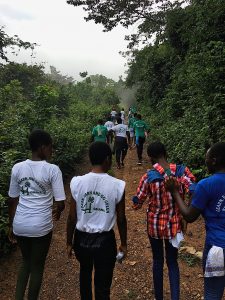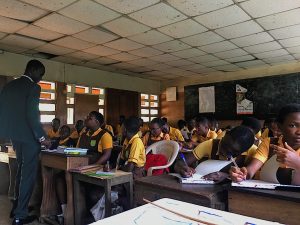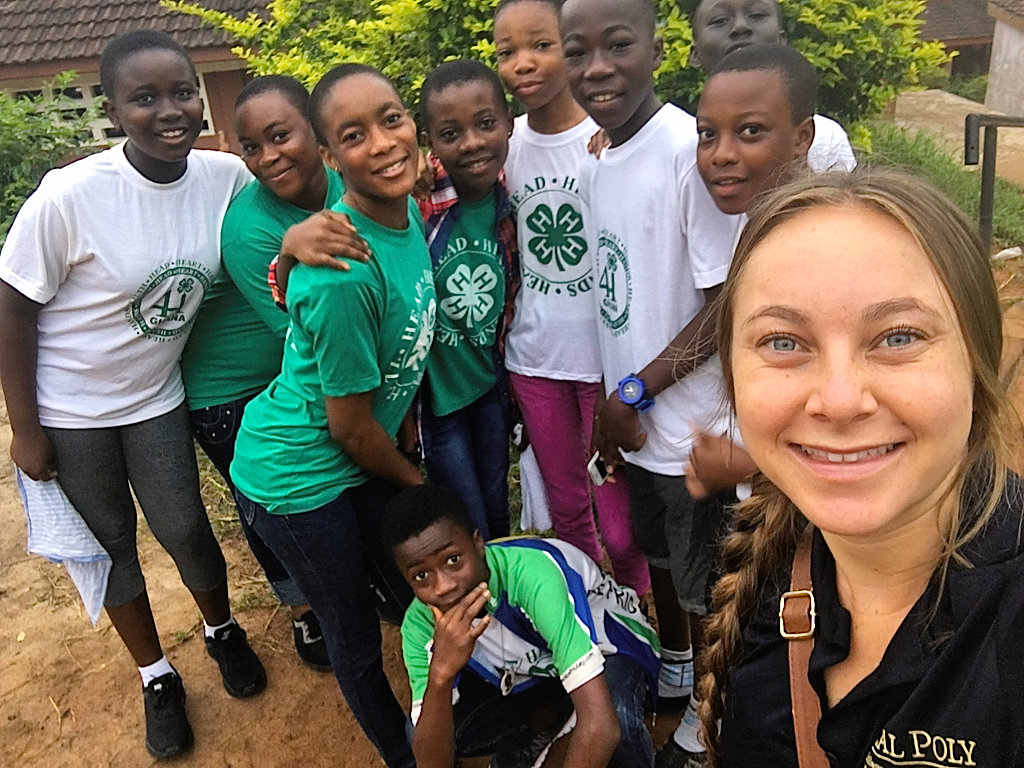On the first day of school at Nana Ankobea Takyiwa, a bell rang and over 200 primary students gathered in lines by grade level on the grass in front of the classrooms. The teachers went up the steps to stand on the cement walkway, and proceeded to list the school rules that all students should adhere to. All the basics were covered: no talking while teachers are talking, no hitting others, be punctual. When it came time to discuss the dress code, the teachers ran through the school uniform, explaining that all students should wear the appropriate shirt with the school crest, boys should be in brown trousers, and girls should be in brown skirts. No sandals should be worn, boys should wear black socks, and girls should wear white socks. Upon seeing several students with no socks on, one teacher pointed them out and said, “You must wear socks, it’s very cold.”
black socks, and girls should wear white socks. Upon seeing several students with no socks on, one teacher pointed them out and said, “You must wear socks, it’s very cold.”
Now in all the research and preparation I did prior to arriving in this country, never once did I see Ghana’s tropical climate described as “cold.” Granted, Nana Ankobea Takyiwa is up in the mountains, so it isn’t as warm as other places throughout the country. Still, on this 78 degree Fahrenheit day with 90 percent humidity, I wasn’t exactly feeling a chill in the air. Although not in line with my American perspective, 78 degrees is on the cooler end of the spectrum for Ghanaians, and the teachers wanted their students to be prepared.
Just like the students are expected to be prepared for school, preparation is an important step in becoming an AgriCorps Fellow. From January to July we had monthly conference calls, assigned readings, and discussions on agricultural education and international food security. In August we began a month-long, pre-service training to prepare us for working and living in a new country. Since being in Ghana, we’ve met with agricultural professionals, teachers, and host families to prepare us for entering our communities. While I am beyond grateful for all this preparation and know that without it, there is no way I could be successful as a Fellow, there are some things I’ve encountered that no amount of training could truly prepare me for.
 No amount of language training could help me to understand what someone is saying in a thick Ghanaian accent from across the room while rowdy students are shouting and playing outside. No amount of culture training could get me ready for the chaotic first week of school schedule that I couldn’t comprehend or follow. No amount of teacher training could prepare me for being led to a classroom of 40 junior high students and told, “The science teacher isn’t here today. We need you to teach the first lesson right now,” handed a textbook I had never seen before, and expected to teach a lesson I had no chance to prepare for.
No amount of language training could help me to understand what someone is saying in a thick Ghanaian accent from across the room while rowdy students are shouting and playing outside. No amount of culture training could get me ready for the chaotic first week of school schedule that I couldn’t comprehend or follow. No amount of teacher training could prepare me for being led to a classroom of 40 junior high students and told, “The science teacher isn’t here today. We need you to teach the first lesson right now,” handed a textbook I had never seen before, and expected to teach a lesson I had no chance to prepare for.
I have been in many awkward and uncomfortable situations since arriving in Ghana. Through these situations, I’ve learned that at some point you have to be okay with being uncomfortable. While it may have been difficult in the moment, I came out of those situations with a better understanding of Ghanaian culture, the people I’m working with, and what my role will look like in the coming months.
Towards the end of the first day of school at Nana Ankobea Takyiwa, grey clouds rolled in and it began to rain. Puddles formed and the ground became muddy. Even the students who prepared for the cold ended up with wet socks. No matter how much we try to plan and prepare for every possible situation, something unexpected will almost always come into play. When the unexpected arises, we have to be okay with letting go of control and living in discomfort, because that is the place we will experience the most personal growth. No one likes wet socks, but wet socks make the feeling of getting home, drying your feet, and curling up in a warm blanket so much better.
Tiffany Thompson earned a degree in Agricultural Communication from California Polytechnic State University, San Luis Obispo. Before serving as an AgriCorps Fellow Tiffany interned as a tour guide with Moo U Guided Livestock Tours.


